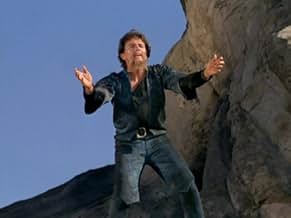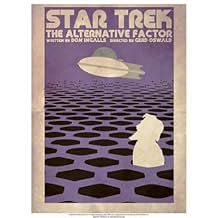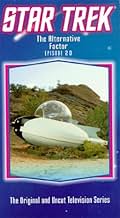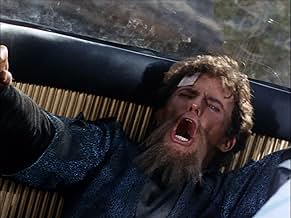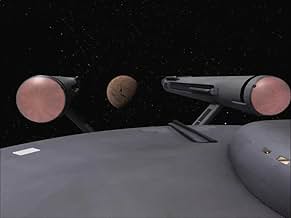The Alternative Factor
- Episode aired Mar 30, 1967
- TV-PG
- 50m
IMDb RATING
5.7/10
4.3K
YOUR RATING
Existence itself comes under threat from a man's power-struggle with his alternate self, with the Enterprise's strained dilithium crystals presenting his key to a final solution.Existence itself comes under threat from a man's power-struggle with his alternate self, with the Enterprise's strained dilithium crystals presenting his key to a final solution.Existence itself comes under threat from a man's power-struggle with his alternate self, with the Enterprise's strained dilithium crystals presenting his key to a final solution.
Bill Blackburn
- Lieutenant Hadley
- (uncredited)
Vince Cadiente
- Security Guard
- (uncredited)
Bill Catching
- Anti-Matter Lazarus Being #2
- (uncredited)
Frank da Vinci
- Crewman
- (uncredited)
Carey Foster
- Enterprise crewmember
- (uncredited)
Tom Lupo
- Security Guard
- (uncredited)
Al Wyatt Sr.
- Anti-Matter Lazarus Being #1
- (uncredited)
- Director
- Writer
- All cast & crew
- Production, box office & more at IMDbPro
5.74.3K
1
2
3
4
5
6
7
8
9
10
Featured reviews
Flawed, but I don't hate it.
One thing that must be considered is that the show didn't have any single dedicated writer or writers, there were many different writers of any one episode to the next.
The person who wrote this particular episode was Don Ingalls, who was a fairly prolific television writer from the early 1960's to mid 1980's. If not prolific, he received a lot of work. It's the only Star Trek episode he is credited with "written by." He is also has a "story by" credit for the 'A Private Little War' episode. That's it.
There were numerous other writers in the series, many for just one episode, so there almost has to be a few misfires, just based on simple probability. This one isn't the strongest, admittedly. It was probably too ambitious and ended up spinning it's wheels. To start with, there's some goofy special effects. Interesting sci-fi themes are explored, but the explanations are vague (or wrong) and unfortunately never tied up. Guest star Robert Brown as Lazarus is in some scenes brilliant, and in others seems over the top. Still, I feel there's enough done well here to make it a worthwhile watch. If nothing else, it's memorable.
The person who wrote this particular episode was Don Ingalls, who was a fairly prolific television writer from the early 1960's to mid 1980's. If not prolific, he received a lot of work. It's the only Star Trek episode he is credited with "written by." He is also has a "story by" credit for the 'A Private Little War' episode. That's it.
There were numerous other writers in the series, many for just one episode, so there almost has to be a few misfires, just based on simple probability. This one isn't the strongest, admittedly. It was probably too ambitious and ended up spinning it's wheels. To start with, there's some goofy special effects. Interesting sci-fi themes are explored, but the explanations are vague (or wrong) and unfortunately never tied up. Guest star Robert Brown as Lazarus is in some scenes brilliant, and in others seems over the top. Still, I feel there's enough done well here to make it a worthwhile watch. If nothing else, it's memorable.
Only the explanation in the last 5 minutes is interesting, but by then it's too late
Yes, it's true, this is one of the worst episodes in the entire series, right down there with "The Empath." Yes, Lazarus is one of the most irritating characters, always falling off cliffs to move the story (such as it is) along.
The *only* thing that's interesting in this episode is when Lazarus finally explains how his cat-and-mouse with his alternate-universe counterpart came about. Both the sci-fi physics element and the madman element of the premise are fascinating. But this explanation comes in the last 5 minutes of the show, after 40 minutes of exhausting shenanigans -- too late to even buy the "r" in the word "redeem."
I would love to know the backstory about how this episode went from fascinating concept to crummy filmed episode. Perhaps that would help ease the pain that this entry's very existence creates in the beating heart of the series.
Another interesting bit about this episode is that with it, the series nearly bottoms out before rocketing to the top with the very next episode, "City on the Edge of Forever." From the very bottom, the only way to go is up.
The *only* thing that's interesting in this episode is when Lazarus finally explains how his cat-and-mouse with his alternate-universe counterpart came about. Both the sci-fi physics element and the madman element of the premise are fascinating. But this explanation comes in the last 5 minutes of the show, after 40 minutes of exhausting shenanigans -- too late to even buy the "r" in the word "redeem."
I would love to know the backstory about how this episode went from fascinating concept to crummy filmed episode. Perhaps that would help ease the pain that this entry's very existence creates in the beating heart of the series.
Another interesting bit about this episode is that with it, the series nearly bottoms out before rocketing to the top with the very next episode, "City on the Edge of Forever." From the very bottom, the only way to go is up.
Ambitious and interesting idea.... weakly executed
This episode of TOS suffered from a mediocre script and very average directing. Robert Brown does a fair job of performing the rather maniacal Lazarus -an interesting biblical allusion, but a bit difficult to interpret the meaning given the character. The cinematography and the script impose limitations that inhibit dramatic development.
The Alternative factor is essentially a sci-fi mystery (hence the choice of Gerd Oswald, known for Perry Mason, as the director). It presents a plot with some interesting, though somewhat impossible, roots in theoretical physics. The known universe is, apparently, about to be destroyed by a malevolent humanoid from the universe of antimatter. Lazarus has been chasing this being for years - to exact revenge for the destruction of his world. The Enterprise crew is stymied and confused (as will be most members of the audience), until the identity of the would-be destroyer is revealed.
Basically, the story line could have been interesting given an hour or so more explanation. As it stands, it appears to be strafed with plot-holes and inconsistent characterization. The franchise, however, learned from its mistakes and did better with similar approaches in a few episodes of TNG and DS9.
The Alternative factor is essentially a sci-fi mystery (hence the choice of Gerd Oswald, known for Perry Mason, as the director). It presents a plot with some interesting, though somewhat impossible, roots in theoretical physics. The known universe is, apparently, about to be destroyed by a malevolent humanoid from the universe of antimatter. Lazarus has been chasing this being for years - to exact revenge for the destruction of his world. The Enterprise crew is stymied and confused (as will be most members of the audience), until the identity of the would-be destroyer is revealed.
Basically, the story line could have been interesting given an hour or so more explanation. As it stands, it appears to be strafed with plot-holes and inconsistent characterization. The franchise, however, learned from its mistakes and did better with similar approaches in a few episodes of TNG and DS9.
Awkward yet riveting hard scifi episode
I have to be contrarian and admit that I like this episode more than most. It's a refreshing bit of hard science fiction with a wonderful mystery setup. The script hints at the possibility of an invasion from the antimatter universe and/or the destruction of all existence due to the collision of both. The execution, however, leaves much to be desired. This riveting premise unfortunately boils down to several encounters with Lazarus, a young man who keeps habitually falling off cliffs in Vasquez Rocks.
The plot of this episode feels paper-thin with plenty of holes. If the very fabric of the universe is at stake and only one (mentally unhinged) person has any information about it, why let him roam around freely about a starship? There's plenty of laughs to be had as well, especially Spock's unemotional accusation of Lazarus being a liar right to his face, complete with an embarrassing musical sting.
It's mostly the incidental music and Robert Brown's over-the-top performance that gives this episode much of its particular charm. It has that Season 1 innocence to it, hinting at a sort of sinister scientific space mystery approach to exploring the Star Trek universe that the show slowly abandoned as it went along. Watch with the un-altered special effects if possible.
The plot of this episode feels paper-thin with plenty of holes. If the very fabric of the universe is at stake and only one (mentally unhinged) person has any information about it, why let him roam around freely about a starship? There's plenty of laughs to be had as well, especially Spock's unemotional accusation of Lazarus being a liar right to his face, complete with an embarrassing musical sting.
It's mostly the incidental music and Robert Brown's over-the-top performance that gives this episode much of its particular charm. It has that Season 1 innocence to it, hinting at a sort of sinister scientific space mystery approach to exploring the Star Trek universe that the show slowly abandoned as it went along. Watch with the un-altered special effects if possible.
Bizarre, but moderately interesting.
Don Ingalls (writing for the series for the first of two times) came up with this so-so attempt at an exploration of existentialism. The story has the Enterprise beaming aboard a strange character named Lazarus (Robert Brown) who claims to be at constant war with some humanoid being with the incredible, frightening power to cause major "rips" in the universe.
Unfortunately, the premise here doesn't yield great results. This is a mostly slow-moving episode that gets overly repetitive, with frequent use of slow-mo negatives and lots of ranting from Brown, who can be rational at times and a nutcase at other times. And who falls off a cliff AT LEAST twice. (That said, Kirk and company are awfully lax in their treatment of the guy. He gets plenty of opportunities to wander around the starship and do all sorts of damage. For one thing, he's VERY interested in the all-important Dylithium crystals that power the ship.)
The concepts explored here are worthy of some interest (Kirk & Spock have an awfully extended conversation when it comes to the possible nature of what they're facing), but in general 'The Alternative Factor' is not altogether satisfactory. Brown, who had a few dozen TV credits to his name but no role to really call his own, does pretty well in his role. He is one memorable thing about an episode that is clearly aiming high but just falls short in an otherwise solid first season.
Best of all is the chilling implication of the resolution. Otherwise, this is not exactly a must-see episode.
Directed by Gerd Oswald ("A Kiss Before Dying").
Six out of 10.
Unfortunately, the premise here doesn't yield great results. This is a mostly slow-moving episode that gets overly repetitive, with frequent use of slow-mo negatives and lots of ranting from Brown, who can be rational at times and a nutcase at other times. And who falls off a cliff AT LEAST twice. (That said, Kirk and company are awfully lax in their treatment of the guy. He gets plenty of opportunities to wander around the starship and do all sorts of damage. For one thing, he's VERY interested in the all-important Dylithium crystals that power the ship.)
The concepts explored here are worthy of some interest (Kirk & Spock have an awfully extended conversation when it comes to the possible nature of what they're facing), but in general 'The Alternative Factor' is not altogether satisfactory. Brown, who had a few dozen TV credits to his name but no role to really call his own, does pretty well in his role. He is one memorable thing about an episode that is clearly aiming high but just falls short in an otherwise solid first season.
Best of all is the chilling implication of the resolution. Otherwise, this is not exactly a must-see episode.
Directed by Gerd Oswald ("A Kiss Before Dying").
Six out of 10.
Did you know
- TriviaThis is the first time that live two-way communication with Starfleet Command is depicted. In previous episodes, communication with Starfleet Command was through delayed radio messages.
- GoofsAt the very beginning when Spock is reporting the atmospheric composition of the planet he has scanned he says "Oxygen Hydrogen atmosphere". This would be a very explosive combination. He meant to say "Oxygen Nitrogen atmosphere" (similar to Earth) but just got his line wrong.
- Crazy creditsThe closing credits are set against a combination background of stills from that episode and previous episodes.
- Alternate versionsSpecial Enhanced version Digitally Remastered with new exterior shots and remade opening theme song
- ConnectionsFeatured in Mr. Plinkett's Star Trek 2009 Review (2010)
- SoundtracksTheme From Star Trek
Written by and credited to Alexander Courage
Details
- Release date
- Country of origin
- Official sites
- Language
- Filming locations
- Production companies
- See more company credits at IMDbPro
Contribute to this page
Suggest an edit or add missing content


